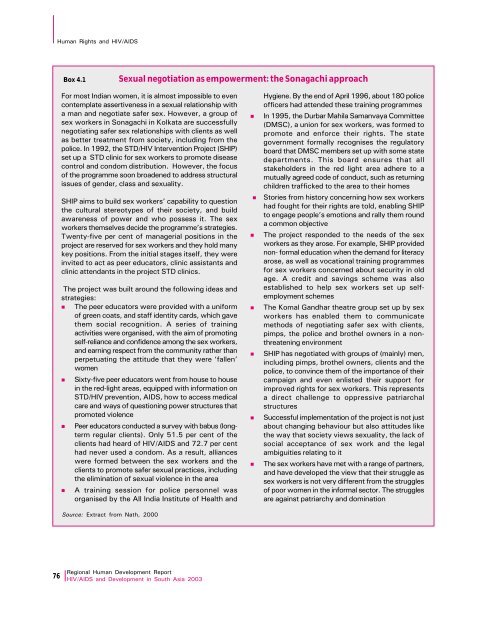Download Report - UNDP Asia-Pacific Regional Centre - United ...
Download Report - UNDP Asia-Pacific Regional Centre - United ...
Download Report - UNDP Asia-Pacific Regional Centre - United ...
You also want an ePaper? Increase the reach of your titles
YUMPU automatically turns print PDFs into web optimized ePapers that Google loves.
Human Rights and HIV/AIDSBox 4.1Sexual negotiation as empowerment: the Sonagachi approachor most Indian women, it is almost impossible to evencontemplate assertiveness in a sexual relationship witha man and negotiate safer sex. However, a group ofsex workers in Sonagachi in Kolkata are successfullynegotiating safer sex relationships with clients as wellas better treatment from society, including from thepolice. In 1992, the STD/HIV Intervention Project (SHIP)set up a STD clinic for sex workers to promote diseasecontrol and condom distribution. However, the focusof the programme soon broadened to address structuralissues of gender, class and sexuality.SHIP aims to build sex workers’ capability to questionthe cultural stereotypes of their society, and buildawareness of power and who possess it. The sexworkers themselves decide the programme’s strategies.Twenty-five per cent of managerial positions in theproject are reserved for sex workers and they hold manykey positions. rom the initial stages itself, they wereinvited to act as peer educators, clinic assistants andclinic attendants in the project STD clinics.The project was built around the following ideas andstrategies:n The peer educators were provided with a uniformof green coats, and staff identity cards, which gavethem social recognition. A series of trainingactivities were organised, with the aim of promotingself-reliance and confidence among the sex workers,and earning respect from the community rather thanperpetuating the attitude that they were ‘fallen’womenn Sixty-five peer educators went from house to housein the red-light areas, equipped with information onSTD/HIV prevention, AIDS, how to access medicalcare and ways of questioning power structures thatpromoted violencen Peer educators conducted a survey with babus (longtermregular clients). Only 51.5 per cent of theclients had heard of HIV/AIDS and 72.7 per centhad never used a condom. As a result, allianceswere formed between the sex workers and theclients to promote safer sexual practices, includingthe elimination of sexual violence in the arean A training session for police personnel wasorganised by the All India Institute of Health andSource: Extract from Nath, 2000nnnnnnnHygiene. By the end of April 1996, about 180 policeofficers had attended these training programmesIn 1995, the Durbar Mahila Samanvaya Committee(DMSC), a union for sex workers, was formed topromote and enforce their rights. The stategovernment formally recognises the regulatoryboard that DMSC members set up with some statedepartments. This board ensures that allstakeholders in the red light area adhere to amutually agreed code of conduct, such as returningchildren trafficked to the area to their homesStories from history concerning how sex workershad fought for their rights are told, enabling SHIPto engage people’s emotions and rally them rounda common objectiveThe project responded to the needs of the sexworkers as they arose. or example, SHIP providednon- formal education when the demand for literacyarose, as well as vocational training programmesfor sex workers concerned about security in oldage. A credit and savings scheme was alsoestablished to help sex workers set up selfemploymentschemesThe Komal Gandhar theatre group set up by sexworkers has enabled them to communicatemethods of negotiating safer sex with clients,pimps, the police and brothel owners in a nonthreateningenvironmentSHIP has negotiated with groups of (mainly) men,including pimps, brothel owners, clients and thepolice, to convince them of the importance of theircampaign and even enlisted their support forimproved rights for sex workers. This representsa direct challenge to oppressive patriarchalstructuresSuccessful implementation of the project is not justabout changing behaviour but also attitudes likethe way that society views sexuality, the lack ofsocial acceptance of sex work and the legalambiguities relating to itThe sex workers have met with a range of partners,and have developed the view that their struggle assex workers is not very different from the strugglesof poor women in the informal sector. The strugglesare against patriarchy and domination76<strong>Regional</strong> Human Development <strong>Report</strong>HIV/AIDS and Development in South <strong>Asia</strong> 2003
















